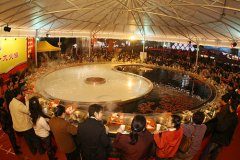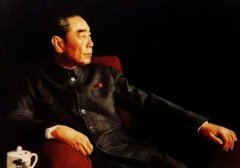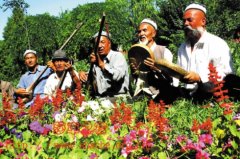4)THEENJOYMENTOFTRAVEL旅行的乐趣(2)
正文 字体大小: 中
(第五期-4)THE ENJOYMENT OF TRAVEL 旅行的乐趣(2) (2012-01-07 21:22:13)
标签: 杂谈 分类: 实用译苑
ON GOING ABOUT AND SEEING THINGS 论旅游观光 In the first place, the true motive of travel should be travel to become lost and unknown. More poetically, we may describe it as travel to forget. Everyone is quite respectable in his home town, no matter what the higher social circles think of him. He is tied by a set of conventions, rules, habits and duties. A banker finds it difficult to be treated just as an ordinary human being at home and to forget that he is a banker, and it seems to me, the real excuse for travel is that he shall be able to find himself in a community in which he is just an ordinary human being. Letters of introduction are all very well for people on business trips, but business trips are by definition outside the category of pure travel. A man stands a poorer chance of discovering himself as a human being if he brings along with him letters of introduction, and of finding out exactly how God made him as a human being, apart from the artificial accidents of social standing. Against the comforts of being well-received by friends in a foreign country and guided efficiently through the social strata of one's own class, there is the greater excitement of a boy scout in a forest, left to his own devices. He has the chance to prove for himself that he can order a fried chicken with the language of fingers alone, or find his way about town by communicating with a Tokyo policeman. At least, such a traveler can come home with a less tender foolish dependence upon his chauffeur and butler. 首先,旅行的真实目的应该是忘掉自我或脱离熟悉环境。更诗意一点,我们可以把它说成是为了忘却的旅行。每个人,无论地位比他更高的社会圈子的人怎样看他,但在他自己的圈子里都是有脸面的,有社会习俗、规则、习惯和职责的约束。银行家在自己的圈里很难被看作是普通人,他自己也做不到。在我看来,他们旅行的真实意图就是要找到一个地方使自己可以成为普通人。介绍信对于出差的人来说很好,但是,就出差一词的定义来看,这样的旅行不在纯旅行的范围。带着介绍信旅行的人,除了有人为的社会地位鉴定外,很少有机会让自己成为普通人,也很少有机会体会上帝怎样让人做普通人。与在国外受到朋友的热情款待和融入到某一社会阶层带来的舒心不同,一个人勇敢地探索大森林,完全靠自己生存,会更加欣喜若狂。这样的人,有机会证明他可以仅仅靠手指比划就能享受炸鸡的美味,或者找东京警察问路就能享受自己在城里转悠的乐趣。至少,有过这样旅行经验的人回家以后,可以不再那么愚蠢地依靠司机或者管家。 A true traveler is always a vagabond, with the joys, temptations and sense of adventure of the vagabond. Either travel is "vagabonding" or it is no travel at all. The essence of travel is to have no duties, no fixed hours, no mail, no inquisitive neighbors, no receiving delegations, and no destination. Shanghai at all? Such travelers never allow themselves the time and leisure for entering into the spirit of the people and thus forfeit one of the greatest benefits of traveling. 真正的旅行家就是流浪者,享受着流浪者的快乐和诱惑,富有冒险意识。旅行一定是流浪式的,否则便不成其为旅行。旅行的关键是无任务、无定时、无邮件、无好奇邻居、无接待、无目的地。好的旅行家绝不知道他要去哪里,更好的旅行家不知到他来自何处,甚至忘却他自己的姓名。屠隆在《冥廖子游》中理想化的描绘里强调了这一点,这个我在下面要引用到并做翻译。或许在某个无任何朋友的陌生地方,如一尼姑所说:“无所特善视者,尽善视普世人也。”不特别地照顾某人,就是照顾大家。没有特定的朋友,大家都是朋友。博爱人们就和他们融入一体,去感受他们的可爱之处以及他们的习俗。这种好处,是坐观光车游览的旅行家完全无法体会到的,因为这些游客呆在旅馆里,他们只能跟国内一起来的游客交流。好比许多美国游客到了巴黎之后一定要去他们都喜欢的餐馆吃饭,他们确定在那里又可以见到一同乘船来的国内游客,品尝味道跟家里一模一样的烤饼。英国人到了上海一定要住英国人开的旅馆,以便早餐照常有火腿、煎蛋和涂着橘皮酱的面包,闲暇休闲喝酒的地方可以四处走走,这也可以避免被人力车夫邀请坐人力车的尴尬。他们特别讲卫生,但何必去上海去呢?如此的旅行家绝不让自己有时间和闲暇跟本地人交流,因而失去了旅行的最大乐趣。 The spirit of vagabondage makes it possible for people taking a vacation to get closer to Nature. Travelers of this kind will therefore insist on going to the summer resorts where there are the fewest people and one can have some sort of real solitude and communion with Nature. Travelers of this sort, therefore, do not in their preparation for journeys go into a department store and take a lot of time to select a pink or a blue bathing suit. Lipstick is still allowable because a vacationist, being a follower of Jean Jacques Rousseau, wants to be natural, and no lady can be quite natural without a good lipstick. But that is due to the fact that one goes to the summer resorts and beaches where everybody goes, and the entire benefit of a closer association with Nature is lost or forgotten. One goes to a famous spring and says to himself, "Now I am entirely by myself," but after supper at the hotel, he takes up a paper in the lounge and discovers that Mrs. B came up to the place on Monday. Next morning on his "solitary" walk, he encounters the entire family of the Dudleys, who arrived by train the night before. On Thursday night he finds out to his great delight that Mrs. S and her husband are also having a vacation in this wonderful secluded valley. Mrs. S then invites the Dudleys to tea, and the Dudleys invite Mr. and Mrs. S to a bridge party, and you can hear Mrs. S exclaim, "Isn't it wonderful? It is just like being in New York, isn't it?" 流浪精神使人能够利用假期去更亲密地接近大自然,所以这类旅行家坚持要去那些人迹寥寥的地方,以便可以真正享受独居以及与大自然融合的乐趣。这些旅行家在出行准备时,绝不会花许多时间刻意去商店选购红色或蓝色的游泳衣,买唇膏还是可以的,因为崇尚让雅克·卢梭亲近自然式旅行的人都喜欢自然,女人如果没有好的唇膏,便不自然了。但这也是因为,在游人如织的度假圣地和海滨,与大自然亲密接触的乐趣荡然无存或者根本就被忘却的缘故。到了一处名泉,人们便欣然自语道:“这下真可独处了。”但在旅馆吃过晚饭,在休息室拿起一张报纸看看,就会发现B夫人在星期一到过这地方。第二天早晨出去“独”步时,又遇到头天晚上到达的达德利一家子。星期四的晚上,他又很高兴地得知S夫妇也将要到这幽静的山谷中来度假。接着就是S夫人邀请达德利全家吃茶点,这一家子又请S夫妇打牌。你还能听见S夫人惊呼:“哎呀,这不是依旧在纽约吗?” I may suggest that there is a different kind of travel, travel to see nothing and to see nobody, but the squirrels and muskrats and wood-chucks and clouds and trees. A friend of mine, an American lady, described for me how she went with some Chinese friends to a hill in the neighborhood of Hangchow, in order to see nothing. It was a misty day in the morning, and as they went up, the mist became heavier and heavier. One could hear the soft beat of drops of moisture on the leaves of grass. There was nothing to be seen but fog. The American lady was discouraged. "But you must come along; there's a wonderful sight on top," insisted her Chinese friends. She went up with them and after a while saw an ugly rock in the distance enveloped by the clouds, which had been heralded as a great sight. "What is there?" she asked. "That is the Inverted Lotus," her friends replied. Somewhat mortified, she was ready to go down. "But there is a still more wonderful sight on top," they said. Her dress was already half damp with the moisture, but she had given up the fight already and went on with them. Finally they reached the summit. All about them was an expanse of mists and fogs, with the outline of distant hills barely visible on the horizon. "But there is nothing to see here," my American friend protested. "That is exactly the point. We come up to see nothing," her Chinese friends replied. 除此以外,我认为还有一种旅行,不为看什么事物,也不为看什么人,看的不过是松鼠、麝鼠、土拨鼠、云和树。我的一位朋友,一位美国女士,曾给我讲述她如何跟几个中国朋友去杭州附近的一坐山看“空无一物”。那是一个大雾的早晨,当她们往山上走的时候,雾越来越浓,甚至可以听见露珠滴在草叶上的轻柔的声音。这时除了浓雾之外什么也看不见,她很失望。“一定坚持啊,山顶有奇观呢。”她的中国朋友鼓励她说。她继续跟着往上走,不久,就见远处有一怪石笼罩在云雾之中,别人都认为这是好景。“那里有什么?”她问。“倒植莲花,”她的朋友回答到。她很懊恼准备下山。“但是山顶还有更奇特的景观呢,”她的朋友又说。这时她的衣服已被露水湿了半,于是放弃了下山的想法,继续跟着他们往上走。终于她们到达了山顶,只见周围茫茫云雾和远处隐隐约约的山峰。“但这里什么也看不到啊。”我的美国朋友抱怨道。“对了,我们就是上来看虚无的。”她的中国朋友回答说。 There is all the difference between seeing things and seeing nothing. Many travelers who see things really see nothing, and many who see nothing see a great deal. I am always amused at hearing of an author going to a foreign country to "get material for his new book, " as if he had exhausted all there was to see in humanity in his own town or country and as if the theme could ever be exhausted. "Thrums" must be unromantic and the Island of Guernsey too dull to build a great novel upon! 看景物和看虚无大不相同。许多看到看景物的游客其实什么也没看到,许多什么景物也没看到的游客倒是看到很多。每当听到有作家跑到外国去“搜集新作资料”时,总觉得好笑,似乎他在本乡本土已没什么可看,亦没什么可写。凡人琐事就一定没有浪漫情趣吗?格恩西岛太单调就不能以此创作一部好的小说吗? We come therefore to the philosophy of travel as consisting of the capacity to see things, which abolishes the distinction between travel to a distant country and going about the fields of an afternoon. The two become the same thing, as Chin Shengt'an insisted. The most necessary outfit a traveler has to carry along with him is "a special talent in his breast and a special vision below his eyebrows," as the Chinese dramatic critic expressed it in his famous running comment on the drama Western Chamber. The point is whether one has got the heart to feel and the eyes to see. If he hasn't, his visits to the mountains are a pure waste of time and money; on the other hand, if he has got "a special talent in his breast and a special vision below his eyebrows, " he can get the greatest joy of travel even without going to the mountains, by staying at home and watching and going about the field to watch a sailing cloud, or a dog, or a hedge, or a lonely tree.










